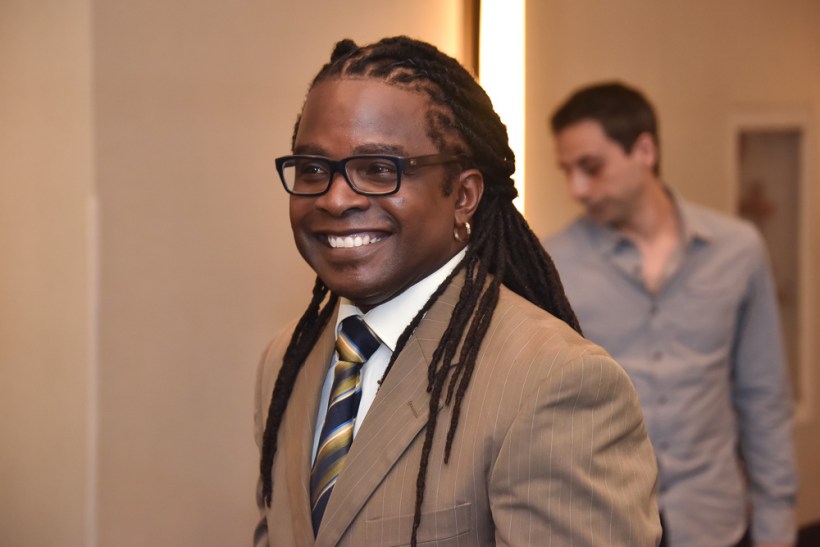Caribbean Research Programme Chair Assigned to Francio Guadeloupe
Former University of St. Martin (USM) president Dr. Francio Guadeloupe has become one of the two recipients of the Dutch Research Council (NWO) grants assigned to the Caribbean part of the Dutch Kingdom and will serve as research programme chair, based at USM for the next five years. The announcement was made on Thursday, 7 January by Dutch Minister of Education, Culture and Science Ms. Ingrid van Engelshoven at the annual four-country consultation meetings for the Dutch Caribbean.

The research programme, entitled Islanders at the Helm, will bring together researchers and societal partners to combine technical, traditional and contemporary knowledge practices to co-create sustainable and inclusive strategies for social adaptation to climatic challenges. In parallel, a trans-Atlantic academic platform and regional expertise centre will be developed fostering research-based education for Aruba, Bonaire, Curaçao, Saba, Sint Eustatius and Sint Martin. Together with programme co-chair, archaeologist Dr. Corinne Hofman of Leiden University, Guadeloupe will manage 3,5 million euros destined to climate resiliency research in the humanities, social and natural sciences. The expertise centre will hold base at the University of St. Martin, University of Aruba and University of Curaçao. These regional institutions of higher learning will hereby receive support with the arrival of PhD researchers, post-doc researchers and visiting scholars from -or intrinsically engaged with- the Caribbean.
In a celebratory note sent to USM on Thursday, Guadeloupe stated that “the NWO programme that he will be chairing is about “us.…. when many sons and daughters and grandchildren with roots on our six islands lead successful lives in the Netherlands, one cannot be surprised by this showing of genuine solidarity from across the Atlantic.
“This project is about NWO truly investing in research that benefits our islands. Climate change is real. We know this from Irma and the rise of the frequency of hurricanes in our region. We know this from the heavy rainfall and droughts on the ABC islands. We know this from the rise in earthquakes and now a volcano waking up in the wider Caribbean. There is absolutely no time to waste on cooperating Kingdom-wide, even if some of us rightly attend to the colonial past. That righteous attention must not deter us from recognising that by paying their taxes, the hardworking Caribbean diaspora in the Netherlands have partially contributed to the funding of this programme”, said Guadeloupe, who also recognised the hard work of those who inside NWO pushed for a fair distribution of funds among kingdom partners.
Guadeloupe expressed his satisfaction with the NWO decision, saying that it is time we strengthen the 3 vital steps many on the six islands are taking. First, to foster more collaboration among that which we used to call the Dutch Antillean countries. Second, for the Dutch Antillean countries to intensify our working relationships with the rest of the Caribbean basin. Third, for the Antilles to work constructively with the Netherlands.
“Islanders at the Helm means that islanders become authors of their sustainable future and the reinvention of the Dutch Kingdom”, he said.
A total of 7 million euros has been awarded to two projects within the NWO programme Caribbean Research: a multidisciplinary approach, of which the other 3,5 million will be assigned to research in ocean pollution and coral reef health. This is the first time that NWO has funded programmes of this size in the Caribbean.
For the Islanders at the Helm programme, much emphasis will be placed on local, traditional and technical knowledge practices in the broadest sense, and how these inform policy options for sustainable development of the islands. Climate change challenges which are found in architecture, water and waste management, agriculture and business will be met with the ancestral awareness through archaeology, resiliency through the arts and humanities, technical innovations in water management and agriculture, and policies that can be designed through community engagement.
On his own behalf, USM President Dr. Antonio Carmona Báez, who will also be serving as one of the principal investigators of the research programme, made public his remarks on the momentous occasion.
“This is the most significant thing that has ever happened to USM, we can now become a full-fledged developmental university sponsoring research-based teaching that is essential to the sustainable progress of our Caribbean people. Together with other institutions of higher education in our region and our brothers and sisters in the diaspora, we can move forward by putting knowledge at the service of our islands. By co-creating solutions with historians, artists, archaeologists, anthropologists, urban engineers, farmers and students we can start to build that sustainable future looking inside and around us. No longer will research agendas be dictated from abroad and from now on the results of research that is conducted in our region will serve the people of the six Caribbean islands. This is about emancipation and empowerment.”, Carmona said.
The programme proposal, developed over a period of 9 months was said to be successful due to the community outreach and the methods of receiving input from stakeholders. Researchers hailing from the Netherlands and the Caribbean will assist the universities of the region in building their capacity in data collection, teaching and harnessing local talent.
[from stmaartenagriculture.com, January 9, 2021]
